

How I Learned to Love Patrons Again. By Matt Smith on March 15, 2017 MATT SMITH is Collection Development Specialist at Kalamazoo (MI) Public Library.
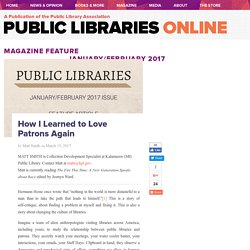
Contact Matt at matts@kpl.gov. Matt is currently reading The Fire This Time: A New Generation Speaks about Race edited by Jesmyn Ward. Hermann Hesse once wrote that “nothing in the world is more distasteful to a man than to take the path that leads to himself.”[1] This is a story of self-critique, about finding a problem in myself and fixing it. This is also a story about changing the culture of libraries. Imagine a team of alien anthropologists visiting libraries across America, including yours, to study the relationship between public libraries and patrons. Patron bashing—i.e. venting, ruminating, gossiping—might be the greatest failure when it comes to customer service and perhaps the greatest barrier to excellent customer service in libraries.
I didn’t always care about patron bashing. My first job at a public library was as a security guard. But that’s simply not true. Library Privacy Checklist for Students in K-12 Schools. This checklist is intended to help libraries of all capacities take practical steps to implement the principles that are laid out in the Library Privacy Guidelines for Students in K-12 Schools.
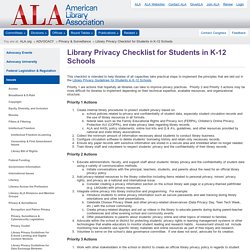
Priority 1 are actions that hopefully all libraries can take to improve privacy practices. Priority 2 and Priority 3 actions may be more difficult for libraries to implement depending on their technical expertise, available resources, and organizational structure. Priority 1 Actions Create internal library procedures to protect student privacy based on: school policies related to privacy and confidentiality of student data, especially student circulation records and the use of library resources in all formats. federal laws such as the Family Educational Rights and Privacy Act (FERPA), Children’s Online Privacy Protection Act (COPPA), and state privacy laws regarding library records.
Priority 2 Actions Priority 3 Actions Resources ALA/AASL Policy statements ALA Code of Ethics Legislation. Organizational Tools - Common Course Assignments - Academic Guides at Walden University. Rebuilding Libraries at DC Public Schools. In February 2014, I joined the District of Columbia Public Schools (DCPS) as director of library programs.
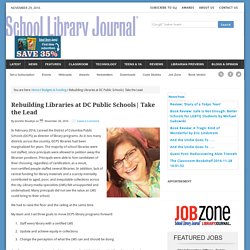
As in too many districts across the country, DCPS libraries had been marginalized for years. The majority of school libraries were not staffed, since principals were allowed to petition away the librarian positions. Principals were able to hire candidates of their choosing, regardless of certification; as a result, non-certified people staffed several libraries. In addition, lack of central funding for library materials and a scarcity mentality contributed to aged, poor, and inequitable collections across the city. Library media specialists (LMS) felt unsupported and undervalued.
We had to raise the floor and the ceiling at the same time. My team and I set three goals to move DCPS library programs forward: Staff every library with a certified LMSUpdate and achieve equity in collectionsChange the perception of what the LMS can and should be doing. Carol Kuhlthau. Guided Inquiry opens the inquiry process at Initiation, immerses students in background knowledge at Selection, guides in exploring interesting ideas at Exploration, enables identifying an inquiry question at Formulation, supports gathering to address the question at Collection, intervenes for creating and sharing at Preparation, and assesses throughout the inquiry process and evaluates at the close.
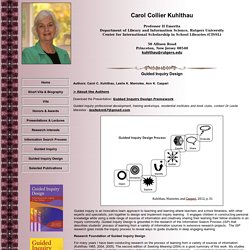
Let’s take a closer look the Guided Inquiry Design Framework. Guided Inquiry Design Framework The Guided Inquiry Design process begins with Open the inquiry to catch students’ attention, get them thinking, and help them make connections with their world outside of school. Next is Immerse, which is designed to build enough background knowledge to generate some interesting ideas to investigate. Then Explore those ideas for an important, authentic engaging inquiry question. School Librarian's Role in Reading Toolkit.
21st-Century Libraries: The Learning Commons. Libraries have existed since approximately 2600 BCE as an archive of recorded knowledge.
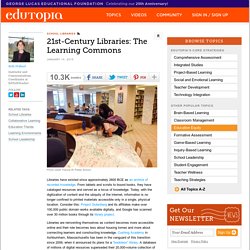
From tablets and scrolls to bound books, they have cataloged resources and served as a locus of knowledge. Today, with the digitization of content and the ubiquity of the internet, information is no longer confined to printed materials accessible only in a single, physical location. Consider this: Project Gutenberg and its affiliates make over 100,000 public domain works available digitally, and Google has scanned over 30 million books through its library project. Libraries are reinventing themselves as content becomes more accessible online and their role becomes less about housing tomes and more about connecting learners and constructing knowledge.
Cushing Academy in Ashburnham, Massachusetts has been in the vanguard of this transition since 2009, when it announced its plans for a "bookless" library. From Library to Learning Commons Photo credit: Francis W. Transparent Learning Hubs. Does Your School Have a Teacher Librarian? A CSLA Film.